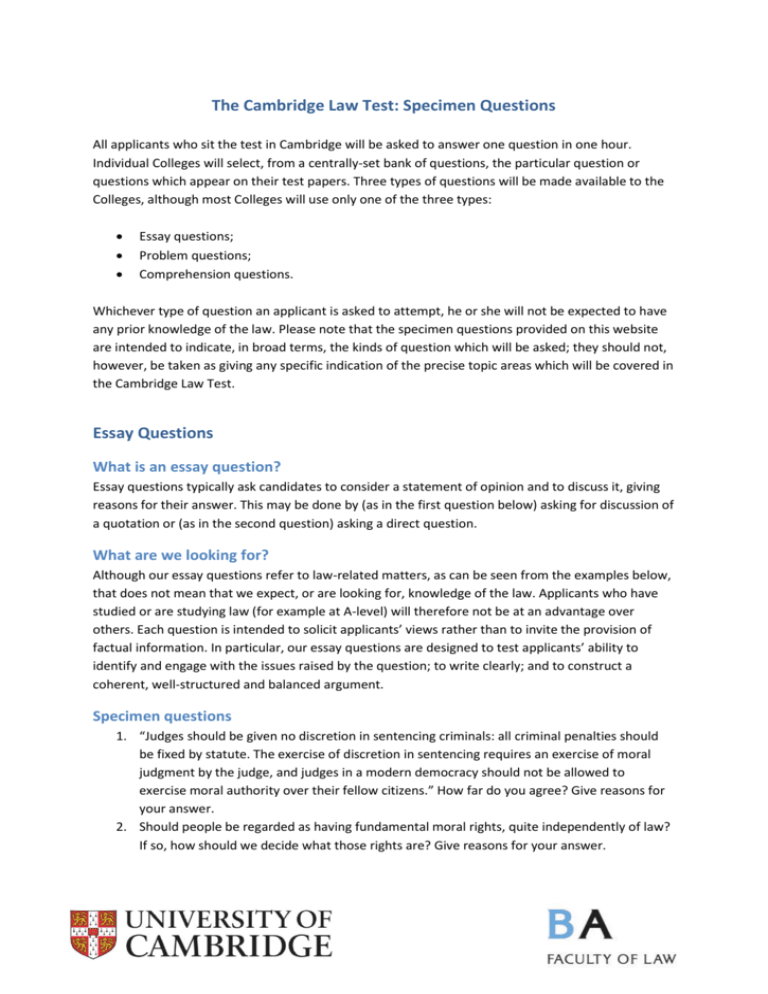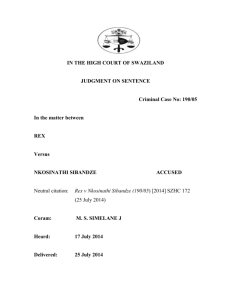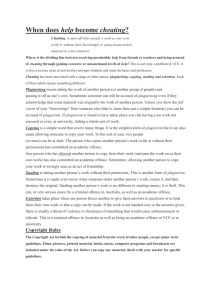The Cambridge Law Test: Specimen Questions
advertisement

The Cambridge Law Test: Specimen Questions All applicants who sit the test in Cambridge will be asked to answer one question in one hour. Individual Colleges will select, from a centrally-set bank of questions, the particular question or questions which appear on their test papers. Three types of questions will be made available to the Colleges, although most Colleges will use only one of the three types: Essay questions; Problem questions; Comprehension questions. Whichever type of question an applicant is asked to attempt, he or she will not be expected to have any prior knowledge of the law. Please note that the specimen questions provided on this website are intended to indicate, in broad terms, the kinds of question which will be asked; they should not, however, be taken as giving any specific indication of the precise topic areas which will be covered in the Cambridge Law Test. Essay Questions What is an essay question? Essay questions typically ask candidates to consider a statement of opinion and to discuss it, giving reasons for their answer. This may be done by (as in the first question below) asking for discussion of a quotation or (as in the second question) asking a direct question. What are we looking for? Although our essay questions refer to law-related matters, as can be seen from the examples below, that does not mean that we expect, or are looking for, knowledge of the law. Applicants who have studied or are studying law (for example at A-level) will therefore not be at an advantage over others. Each question is intended to solicit applicants’ views rather than to invite the provision of factual information. In particular, our essay questions are designed to test applicants’ ability to identify and engage with the issues raised by the question; to write clearly; and to construct a coherent, well-structured and balanced argument. Specimen questions 1. “Judges should be given no discretion in sentencing criminals: all criminal penalties should be fixed by statute. The exercise of discretion in sentencing requires an exercise of moral judgment by the judge, and judges in a modern democracy should not be allowed to exercise moral authority over their fellow citizens.” How far do you agree? Give reasons for your answer. 2. Should people be regarded as having fundamental moral rights, quite independently of law? If so, how should we decide what those rights are? Give reasons for your answer. Problem Questions What is a problem question? In a problem question, applicants are given a statement of law - for example, an excerpt from a statute or a passage from a judgment of a judge given in a court - and are asked to explain how it would apply in certain factual situations. What are we looking for? Problem questions are not designed to test applicants’ knowledge of the law. No prior knowledge of the law is expected or needed: all of the law-related information necessary to answer the question is provided in the given statement of law. Applicants who have studied or are studying law (for example at A-level) will therefore not be at an advantage over others. Problem questions are designed to test applicants’ ability to understand the given statement of law; to apply it accurately to the given factual situations, drawing relevant distinctions; and to explain their reasoning in a clear and logical way. Specimen question A piece of legislation (“the Act”) provides as follows: Section 1 (1) A person who is not a party to a contract (a “third party”) may in his own right enforce a term of the contract if— (a) the contract expressly provides that he may, or (b) subject to subsection (2), the term purports to confer a benefit on him. (2) Subsection (1)(b) does not apply if on a proper construction of the contract it appears that the parties did not intend the term to be enforceable by the third party. (3) The third party must be expressly identified in the contract by name, as a member of a class or as answering a particular description but need not be in existence when the contract is entered into. Section 2 (1) Where a third party has a right under section 1 to enforce a term of the contract, the parties to the contract may not, by agreement, cancel the contract, or vary it in such a way as to extinguish or alter his entitlement under that right, without his consent if— (a) …; (b) the promisor is aware that the third party has relied on the term, or (c) the promisor can reasonably be expected to have foreseen that the third party would rely on the term and the third party has in fact relied on it. Consider the application of the Act to each of the following alternative circumstances. In doing so, you can assume that a contract exists where two (or more) parties enter into an agreement in which they intend to be legally bound, and that a contract need not be in writing. i. G and H are friends. In the pub one night they decide to play the National Lottery each week. Each is to contribute £1.50 and they would each choose three sets of numbers every other week, with H choosing three sets of numbers one week and G three sets of numbers the other week. They agree that any winnings are to be divided equally between the two of them and J, a friend. In the sixth week, when G has chosen the numbers, one of the combinations won a prize of £250,000. G, in whose name the ticket was registered, wishes to keep the prize. Can J sue G under the Act? Give reasons for your answer. ii. On Mr and Mrs C’s marriage, their wealthy relative B buys an expensive 3 piece suite as a wedding gift from A Ltd, a well known department store. B makes it clear when purchasing the 3 piece suite that it is a gift for friends. The contract includes a term to the effect that the goods are of satisfactory quality. After 2 weeks of wear the fabric on the suite wears thin and frays, and after 3 weeks, two castors collapse. Can Mr and Mrs C sue A Ltd under the Act? Give reasons for your answer. iii. X promises Y to pay Z £500 and Z, on hearing of this and because of it, immediately pays some outstanding bills. Before any money is handed over to Z, X and Y change their mind and agree to cancel their contract. Can Z sue X under the Act? Give reasons for your answer. Comprehension Questions What is a comprehension question? In a comprehension question, applicants are presented with a passage of text—for example, an excerpt from a judgment or article—and are asked to summarise it and to answer specific questions about it. What are we looking for? Comprehension questions are not designed to test applicants’ knowledge of the law. No prior knowledge of the law is expected or needed: all of the information necessary to answer the question is provided in the passage. Applicants who have studied or are studying law (for example at A-level) will therefore not be at an advantage over others. Comprehension questions are designed to test applicants’ ability to understand the text; to write clearly; and to develop balanced, well-reasoned arguments. Specimen question Jones (“J.”), a tramp who lived in an unoccupied building, woke up to discover that a cigarette he had been smoking had set fire to the mattress on which he was lying. He did not attempt to put out the fire, and moved to another room. The house caught fire. J. was convicted of the offence of arson under the Criminal Damage Act 1971. The Court of Appeal (“CA”) dismissed his appeal against conviction, but he appealed to the House of Lords (“HL”). The CA asked the House of Lords to consider the following question: Whether the offence of arson is committed when a defendant accidentally starts a fire and thereafter, intending to destroy or damage property belonging to another or being reckless as to whether any such property would be destroyed or damaged, fails to take any steps to extinguish the fire or prevent damage to such property by that fire? Giving the judgment of the HL, Lord Diplock said: The first question to be answered where a completed crime of arson is charged is: "Did a physical act of the accused start the fire which spread and damaged property belonging to another?”. This is a pure question of causation; it is one of fact to be decided by the jury. It should be answered "No" if, in relation to the fire during the period starting immediately before its ignition and ending with its extinction, the role of the accused was at no time more than that of a passive bystander. In such a case the subsequent questions to which I shall be turning would not arise. The conduct of such a person may indeed be deplorable, but English law has not so far developed to the stage of treating it as criminal; and if it ever were to do so there would be difficulties in defining what should be the limits of the offence. If on the other hand the question is answered "Yes," as it was by the jury in the instant case, then for the purpose of the further questions the answers to which are determinative of his guilt of the offence of arson, the conduct of the accused, throughout the period from immediately before the moment of ignition to the completion of the damage to the property by the fire, is relevant; so is his state of mind throughout that period. Since arson is a result-crime the period may be considerable, and during it the conduct of the accused that is causative of the result may consist not only of his doing physical acts which cause the fire to start or spread but also of his failing to take measures that lie within his power to counteract the danger that he has himself created; and if his conduct, active or passive, varies in the course of the period, so may his state of mind at the time of each piece of conduct. If at the time of any particular piece of conduct by the accused that is causative of the result, the state of mind that actuates his conduct falls within the description of one or other of the states of mind that are made a necessary ingredient of the offence of arson by section 1 of the Criminal Damage Act 1971 (i.e. intending to damage property belonging to another or being reckless as to whether such property would be damaged) I know of no principle of English criminal law that would prevent his being guilty of the offence created by that subsection. Likewise I see no rational ground for excluding from conduct capable of giving rise to criminal liability, conduct which consists of failing to take measures that lie within one's power to counteract a danger that one has oneself created, if at the time of such conduct one's state of mind is such as constitutes a necessary ingredient of the offence. No one has been bold enough to suggest that if, in the instant case, the accused had been aware at the time that he dropped the cigarette that it would probably set fire to his mattress and yet had taken no steps to extinguish it he would not have been guilty of the offence of arson, since he would have damaged property of another being reckless as to whether any such property would be damaged. I cannot see any good reason why, so far as liability under criminal law is concerned, it should matter at what point of time before the resultant damage is complete a person becomes aware that he has done a physical act which, whether or not he appreciated that it would at the time when he did it, does in fact create a risk that property of another will be damaged; provided that, at the moment of awareness, it lies within his power to take steps, either himself or by calling for the assistance of the fire brigade if this be necessary, to prevent or minimise the damage to the property at risk. My Lords, in the instant case the prosecution did not rely upon the state of mind of the accused as being reckless during that part of his conduct that consisted of his lighting and smoking a cigarette while lying on his mattress and falling asleep without extinguishing it. So the jury were not invited to make any finding as to this. What the prosecution did rely upon as being reckless was his state of mind during that part of his conduct after he awoke to find that he had set his mattress on fire and that it was smouldering, but did not then take any steps either to try to extinguish it himself or to send for the fire brigade, but simply went into the other room to resume his slumbers, leaving the fire from the already smouldering mattress to spread and to damage that part of the house in which the mattress was. The recorder, in his lucid summing up to the jury told them that the accused having by his own act started a fire in the mattress which, when he became aware of its existence, presented an obvious risk of damaging the house, became under a duty to take some action to put it out. The Court of Appeal upheld the conviction, but the basis for their decision appears to be somewhat different from that of the recorder. As I understand the judgment, in effect it treats the whole course of conduct of the accused, from the moment at which he fell asleep and dropped the cigarette on to the mattress until the time the damage to the house by fire was complete, as a continuous act of the accused, and holds that it is sufficient to constitute the offence of arson if at any stage in that course of conduct the state of mind of the accused, when he fails to try to prevent or minimise the damage which will result from his initial act, although it lies within his power to do so, is that of being reckless as to whether property belonging to another would be damaged. My Lords, these alternative ways of analysing the legal theory that justifies a decision which has received nothing but commendation for its accord with commonsense and justice, have, since the publication of the judgment of the Court of Appeal in the instant case, provoked academic controversy. Each theory has distinguished support. Professor Smith espouses the "duty theory"; Professor Williams prefers that of the continuous act. When applied to cases where a person has unknowingly done an act which sets in train events that, when he becomes aware of them, present an obvious risk that property belonging to another will be damaged, both theories lead to an identical result; and since what your Lordships are concerned with is to give guidance to trial judges in their task of summing up to juries, I would for this purpose adopt the duty theory as being the easier to explain to a jury; though I would commend the use of the word "responsibility," rather than "duty" which is more appropriate to civil than to criminal law, since it suggests an obligation owed to another person, i.e., the person to whom the endangered property belongs, whereas a criminal statute defines combinations of conduct and state of mind which render a person liable to punishment by the state itself. So, I would answer the certified question "Yes" and would dismiss the appeal. Answer both of the following questions: 1. Explain in your own words, and indicating how it differed from the reasoning of the Court of Appeal, the reasoning of Lord Diplock in this case. 2. In the first paragraph of his judgment, Lord Diplock suggests that a bystander who came across the fire would not be guilty of any offence if he failed to take steps which were within his powers to put it out. Why should that be? Do you agree that such a person should not be guilty of an offence? Give reasons for your answer.







